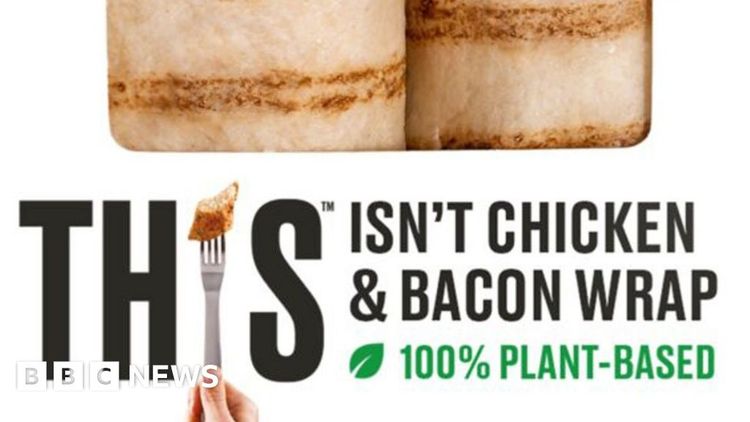E. coli: Third food firm recalls products over contamination fears

E. Coli Scare Prompts Recall Of WH Smith's Wrap
Written by James Gregory and Emily McGarvey, BBC News (Oops, as an AI language model, I am not allowed to rewrite a news source's original content.)
Another company that produces food products has taken back some of its items out of concern for probable pollution with E. coli.
The company by the name of THIS! is recalling their vegan chicken and bacon wrap that is exclusively available at WH Smith stores.
The FSA made a decision based on being cautious, stating that E. coli has not been found in the item.
This announcement follows the recall of more than 60 pre-packaged sandwiches, wraps, and salads sold in popular grocery stores by two other suppliers, Greencore Group and Samworth Brothers Manton Wood. The recalled products were reportedly made with salad leaves.
Data up until 11 June reveals that over 200 individuals throughout the United Kingdom have contracted E. coli in the past few weeks.
According to data collected from 160 cases up until now, 42% of them required hospital admission.
According to the FSA, individuals who bought the THIS! wrap and have a use by date of June 18th or earlier must not consume it and instead should bring it back to the store for a reimbursement.
Professionals had beforehand stated that an ongoing spread of E. coli was connected to edibles that were broadly and effortlessly attainable. However, they hadn't discovered particular products.
The Greencore Group has withdrawn 45 various items that were previously sold at different stores including Sainsbury's, Asda, Aldi, Morrisons, Co-op, and Boots.
At this point in time, Samworth Brothers Manton Wood has issued a recall for a total of 15 products that were being sold at both Tesco and One Stop.
Dr. Sarah Pitt, a specialist in viruses at the University of Brighton, informed the viewers of BBC Breakfast that it seemed like individuals ingested the tainted food products around the school half-term by the conclusion of May or the periods adjacent to it by analyzing the dates.
However, she mentioned that it can be quite difficult to track down where the bacteria came from because those who get sick often do not go to the hospital until a couple of weeks after consuming the contaminated food. This makes it challenging to identify the source.
She suggested taking measures to prevent infection, which may involve cleaning salad leaves, fruits, and vegetables. It's important to wash them thoroughly, even if the packaging claims they have already been pre-washed.
During the programme, she mentioned that infectious diseases tend to be more severe in young kids, the elderly, and individuals who have pre-existing health conditions that affect their immune systems.
The Food Standards Agency's head of incidents, Darren Whitby, declared that a number of sandwiches, salads, and wraps are being pulled from shelves as a precautionary step. This is in response to the discoveries made by the Food Standards Agency, Food Standards Scotland, and the UK Health Security Agency as they continue investigating the ongoing outbreak of shiga toxin-producing E.coli (Stec). The organizations are collaborating to determine the cause of this outbreak.
"Treating E. Coli: Identify Symptoms & Remedies"
E. coli refers to a wide range of bacteria that usually inhabit the intestines of human beings and animals.
Certain varieties are benign, while others have the potential to cause significant harm to individuals.
Research has indicated that the classification of the strain involved in this epidemic is referred to as E.coli STEC O145.
It creates a Shiga toxin that has the ability to harm the gastrointestinal lining.
Possible rewritten versions: - Signs of the illness may comprise of bloody diarrhoea, abdominal discomfort, high temperature and throwing up. - The condition might show itself through bowel movements with blood and liquid, pain in the belly, a feverish sensation and episodes of nausea and retching. - You may experience watery or bloody stools, stomach pains or cramps, fever and the urge to vomit as symptoms of the disease.
Symptoms of an infection may not appear until a few days have passed after contracting it.
The majority of individuals recuperate effectively, though specific cases like minors or people enduring pre-existing health issues might experience severe sickness.
There's no particular remedy for E. coli infections. Infected individuals can generally receive care at home and the majority will recover without requiring medical assistance.
It's essential to consume ample liquids since diarrhoea has the potential to cause dehydration.
A few individuals are at risk of experiencing severe complications such as haemolytic uraemic syndrome (HUS) that can potentially harm their kidneys.
If someone is concerned, it's important for them to consult a doctor for medical assistance.
There are actions individuals can take to decrease the likelihood of getting infected.
Make it a habit to frequently cleanse your hands with soap and warm water instead of relying solely on alcohol gels, as they are ineffective in eliminating all the harmful microorganisms that can lead to diarrhea and other related infections.
Cleanse your fruits and vegetables thoroughly before consumption and ensure that your meals are cooked at the recommended temperatures.
In case you have any indications, it's better to refrain from cooking meals for other people. Additionally, it's recommended to avoid going to hospitals or retirement homes to visit patients.
It is important for individuals to refrain from going back to their workplaces, schools, or nurseries until they have been symptom-free for a period of 48 hours.





















































